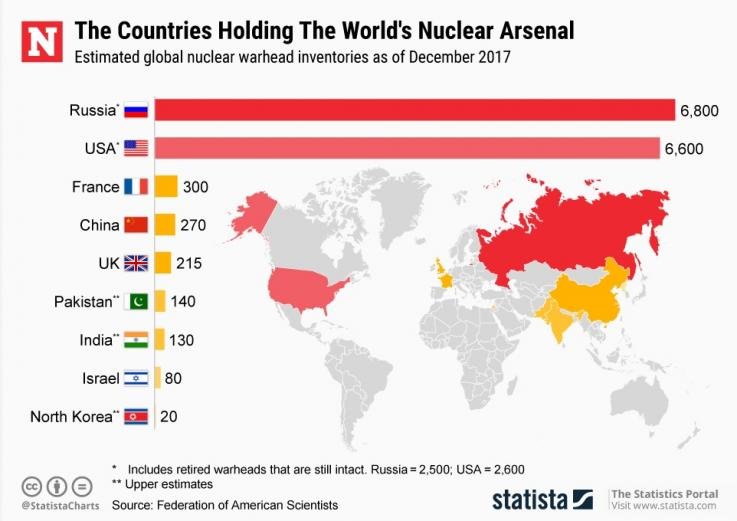U.S. MILITARY SAID USING NUCLEAR WEAPONS COULD HAVE ‚DECISIVE RESULTS‘ AND CREATE ‚STABILITY‘ IN DELETED DOCUMENT
BY TOM O’CONNOR ON 6/19/19 AT 3:17 PM EDT
The unclassified document, published last week by the Joint Chiefs of Staff and entitled „Nuclear Weapons: Planning and Targeting,“ was taken down from the Pentagon’s website shortly after. A copy, however, was preserved by the Federation of American Scientists, where government secrecy project analyst Steven Aftergood noted a particularly „Strangelovian passage“ in reference to the Cold War-era classic Dr. Strangelove, a satirical take on nuclear tensions between the U.S. and Soviet Union.
„Using nuclear weapons could create conditions for decisive results and the restoration of strategic stability. Specifically, the use of a nuclear weapon will fundamentally change the scope of a battle and create conditions that affect how commanders will prevail in conflict,“ the report read.
Moreover, the report began with a quote from nuclear war theorist Herman Khan, identified as one of the primary inspirations for Stanley Kubrick’s 1964 black comedy film. The passage read: „My guess is that nuclear weapons will be used sometime in the next hundred years, but that their use is much more likely to be small and limited than widespread and unconstrained.“
Months after President Donald Trump came to office in 2017, Newsweek featured a couple of op-eds comparing his rise to the tale of Dr. Strangelove. While nuclear war has long been a theme in prominent works of fiction, real-life measures restricting the use of such weapons have come under threat in recent years, with the U.S. and Russia trading accusations of arms control treaty violations.
Washington charged Moscow with breaking the 1987 Intermediate-range Nuclear Forces treaty by developing a missile system that allegedly fell within the restricted range of 310 to 3,420 miles and then suspended the agreement in February. Russian officials have counterclaimed that the U.S.‘ Aegis Ashore missile defense system in Romania—and soon to be operational in Poland—because it could allegedly be used offensively as well.
The Trump administration has also delayed negotiations to renew the New Strategic Arms Reduction Treaty (START), which both the U.S. and Russia’s nuclear capabilities, as the president pushed for a new deal involving China. Beijing, which possessed significantly less nuclear assets than Moscow and Washington, has said it „will never“ join such an arrangement as it felt the White House did not even respect current international deals like the 2015 Iran nuclear accord.
The U.S. and Russia have also accused one another of seeking low-yield nuclear weapons reminiscent of Khan’s quote and that many experts since have warned may more likely to be used in the event of a conflict. Moscow officials have also characterized the Trump administration’s 2017 Nuclear Posture Review as relaxing restrictions on the use of nuclear weapons, while Washington has raised red flags in regards to Russia’s development of new hypersonic and cruise missiles capable of evading modern defenses.
The bout escalated once again late last month when Defense Intelligence Agency Director Robert Ashley claimed that „Russia probably is not adhering to its nuclear testing moratorium in a manner consistent with the ‚zero-yield‘ standard'“—an apparent violation of the 1996 Comprehensive Nuclear-Test-Ban Treaty (CTBT). The Russian Foreign Ministry called the claims „absolutely unfounded“ Wednesday, warning „they can be only considered as a cover up for Washington’s steps on leaving the CTBT and resuming full-fledged nuclear tests.“
No comments:
Post a Comment